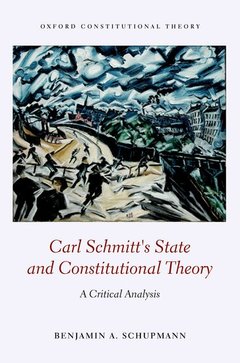Carl Schmitt's State and Constitutional Theory A Critical Analysis Oxford Constitutional Theory Series
Langue : Anglais
Auteur : Schupmann Benjamin A.

Can a constitutional democracy commit suicide? Can an illiberal antidemocratic party legitimately obtain power through democratic elections and amend liberalism and democracy out of the constitution entirely? In Weimar Germany, these theoretical questions were both practically and existentially relevant. By 1932, the Nazi and Communist parties combined held a majority of seats in parliament. Neither accepted the legitimacy of liberal democracy. Their only reason for participating democratically was to amend the constitution out of existence. This book analyses Carl Schmitt's state and constitutional theory and shows how it was conceived in response to the Weimar crisis. Right-wing and left-wing political extremists recognized that a path to legal revolution lay in the Weimar constitution's combination of democratic procedures, total neutrality toward political goals, and positive law. Schmitt's writings sought to address the unique problems posed by mass democracy. Schmitt's thought anticipated 'constrained' or 'militant' democracy, a type of constitution that guards against subversive expressions of popular sovereignty and whose mechanisms include the entrenchment of basic constitutional commitments and party bans. Schmitt's state and constitutional theory remains important: the problems he identified continue to exist within liberal democratic states. Schmitt offers democrats today a novel way to understand the legitimacy of liberal democracy and the limits of constitutional change.
Benjamin A. Schupmann is a lecturer in Philosophy, Politics, and Economics in the Division of Social Sciences at Yale-NUS. His research interests include the history of political thought, state and constitutional theory, constitutionalism, and 20th-century German political and legal thought.
Date de parution : 12-2017
Ouvrage de 256 p.
16.4x24 cm
Thèmes de Carl Schmitt's State and Constitutional Theory :
© 2024 LAVOISIER S.A.S.



